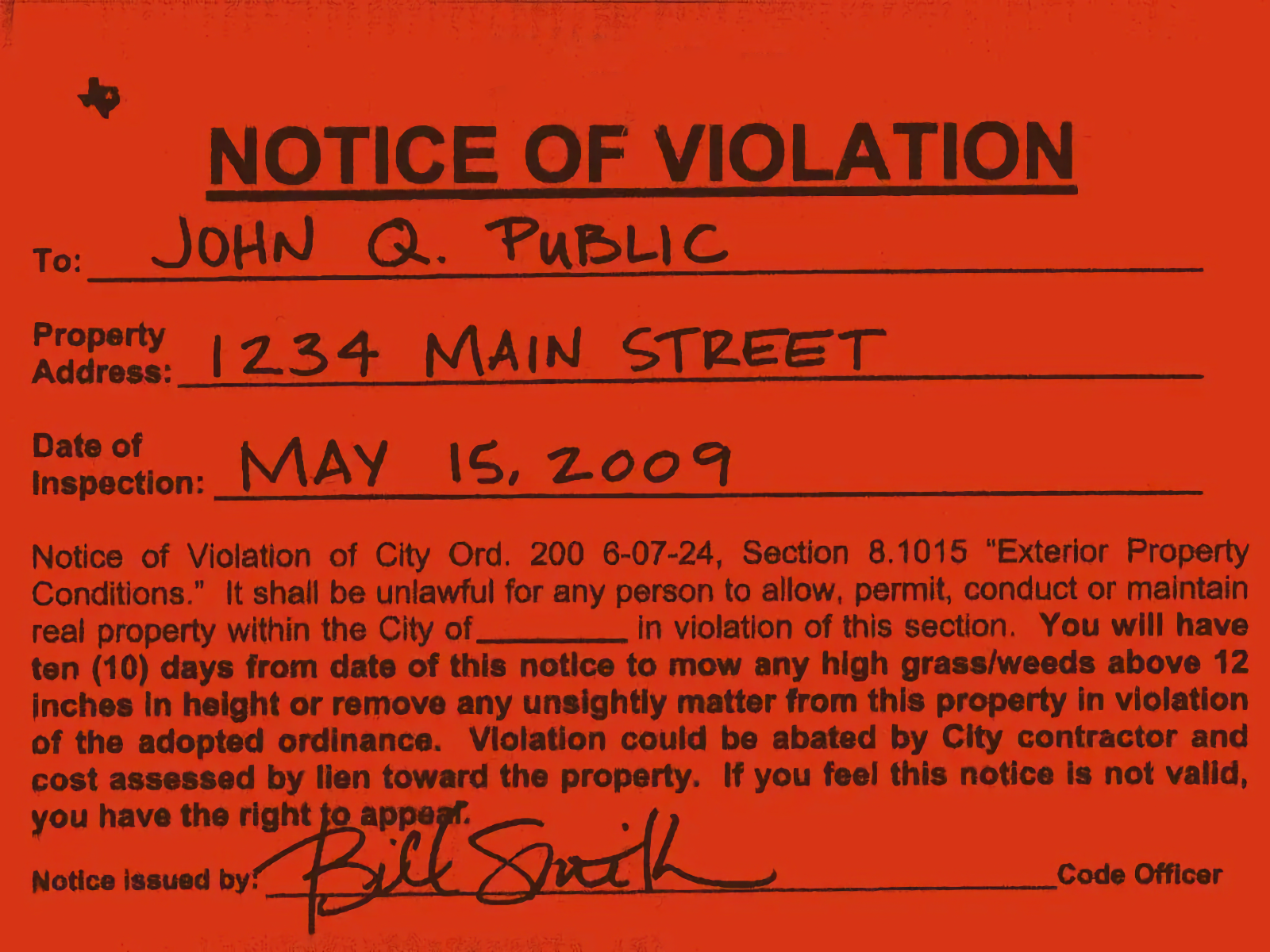It seems that the properties I get the most inquires about are the ones with red tags on them – they tend to be the cheapest of the cheap, and so they get a lot of interest from people. Also, red tagged properties tend to stay on the market a long time, so it’s not uncommon for me to have several buyers write to me about the same property.
So what is a red tag? A red tag is a notification that a building or improvement is out of compliance with the county code. It might be a violation of the building codes, zoning ordinances, environmental protection ordinances, or it could be the that the building is hazardous and needs abatement.
How does a red tag get to be put on a property? What often happens is that a neighbor will inform the county that he suspects some kind of violation is occurring on a given property, as might happen if someone is building a fence that is too high and might block a view or create some other hazard. Another common way to get a red tag is to convert an area of a home (e.g. a garage) into living space, and then to rent out that living space. Many a disgruntled tenant has informed the Planning Department that their landlords, after having evicted them, has an illegal dwelling unit on their property! And let’s not forget the disgruntled ex-spouse, who, after quitting a property, informs the county of the violations they know to exist.
It’s easy to file a complaint that can lead to a red tag – you can do so right from the comfort of your own web browser:
http://www.sccoplanning.com/PlanningHome/CodeCompliance/CodeComplaintForm.aspx
Some red tags are easy to rectify. For example, if you’ve constructed a fence that’s too tall – just lower the height. If you’ve illegally converted a garage to a living space, just remove all the stuff you added, like maybe the toilet/shower/sink and whatever else it is the county or city asks of you.
Other red tags, however, are more difficult to rectify – for example, if you have done some illegal grading (a violation of the environmental protection ordinances). To do this, you’ll need to get out an engineering company to design a proper retaining wall, etc. – this can be pretty expensive, several thousands of dollars, then apply for the permit, and then build the retaining wall again.
Another example might be a house with severe structural issues, such as a failing foundation. This might be very expensive to fix – $50,000 or $100,000 or even quite a bit more. Now, how many people – even homeowners – have that kind of money they can easily get ahold of? And any home owner that can’t get that kind of money is just the kind of homeowner who may be forced, by circumstances, to sell the property, with the red tag on it.
Unfortunately, a red tag is considered to be a cloud on title by most lenders – and lenders are very, very wary of any kind of cloud on title! That means that it’s comparatively difficult to get a loan on a property with a red tag. Consequently, a seller will usually need to discount the price of the property quite heavily – beyond the money needed to rectify the red tag, even – to find a buyer who can pay all cash for the property, or who has a lender willing to work a red tagged property. These kinds of lenders are typically “hard money lenders” who require that the buyer have a significant amount of cash (e.g. 30%) they can put towards the purchase…and will usually have a fairly high interest rate (5-7% over the standard 30 year fixed, say). The idea behind financing such as this is that the buyer will buy use the financing in the short term only, improve the property (and remove the red tag), and then re-finance it with traditional financing.
The good news is that you can certainly sell a property with a ted tag on it. While it is a cloud on title and conventional lenders will not loan if there is a recorded code violation, the code violation may not actually be recorded – which generally takes some time (six months – but could be more, or less). If there is not a recorded violation on title, you should still be able to get a conventional loan on the property, assuming that the appraiser doesn’t throw up any red flags to the lender due to some obvious problem with the condition of the property.
But even if the red tag has been recorded, the property can still sell – just not with conventional financing. You may need to sell to a cash buyer, or a buyer using private money (a hard money loan). Another option is to find a buyer with a conventional loan, and allow the buyer to rectify the red tag during escrow, and get the tag cleared before the loan funds.
You could also sell the property to someone using FHA 203K financing, which lends the buyer money above the purchase price to rectify the red tag with repairs performed after closing.
Getting your Santa Cruz property red-tagged is no fun, but it’s not the end of the world. If you need to, you can always sell the property and make it someone else’s problem. Just call me get moving!
Santa Cruz Beach Homes for Sale
2
3
4
5
6
7
8
9
10
11
12
13
14
15
16
17
18
19
20
21
22
23
24
25





